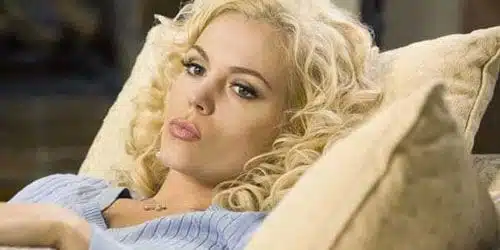
Early on in Anna Nicole, Anna Nicole (Agnes Bruckner) practices her newly learned dance moves on a tetherball pole while her young son watches nearby. She still goes by her given name, Vickie Lynne, and she is only in the nascent stages of a meteoric rise to fame and wealth built on a shamelessness so sheer it attained its own kind of innocence. She finishes her routine, catches her son’s smiling gaze, and wraps him up in an embrace as genuine as it is startling, a moment that epitomizes the film’s odd combination of lurid tabloid fodder and admiration for Anna Nicole.
Following Anna Nicole from her difficult childhood in small-town Texas to her status as international icon and “balls-to-the wall party girl,” Mary Harron’s movie — premiering on Lifetime on 29 June — is peppered with such perfectly confusing scenes. The confusion suits an episodic, commercial break-informed structure, which avoids traditional narrative tension and release in favor of a dreamlike tone that’s an appropriate representation of Anna Nicole’s absurd aspirations and Xanax-fueled lifestyle. Anna Nicole is controlled and poised where Anna Nicole is anything but, putting the latter under a microscope and producing an image of almost hallucinatory clarity.
One striking representation of her gaudy desires comes early, when a very young Vickie turns away from her mother’s philandering husband (William Day) and into the gaze of her future self, who looks back at her from a mirror, jewels dripping down the plunging neckline of her red dress. “You’re so pretty,” the reflection whispers to her younger self, “When you grow up, you’re gonna get earrings just like mine.” Vickie never doubts it. The exchange is poised between camp and earnestness, much as Anna Nicole herself blurs the distinction between tackiness and glamour.
Vickie has good reason to seek escape in fantasy she takes as fact. And after a childhood where her mother (Virginia Madsen) locks Vickie in her room to keep her from going bowling, and teenage years that leave her with a son to take care of and no place to go, Vickie flees for real, and quickly establishes herself as a star at a strip club. Here she acquires her “build-on” double-Ds as well as a lifelong Xanax habit.
When octogenarian billionaire J. Howard Marshall (Martin Landau), is wheeled into the club, she appears to him like a apparition in a haze of light, kissing him on the lips, whispering in his ear. He snaps her up and gives her a ranch to live on faster that you can say “creepy.” Landau does fine work here as a man with a clear-eyed view of himself and what he has to offer, and it is to his and Bruckner’s credit that Marshall’s relationship with Anna is bizarrely touching and believable; when she calls him “Papa,” it sounds like a candid, affectionate expression of their dynamic in spite of the unpleasant Freudian associations.
Then, as inevitably as the sun rises or the mighty fall, a Playboy contract and fame quickly manifest, bringing down ire of Howard’s son E. Pearce Marshall (Cary Elwes). With a twitch of his lips and a few hushed words, Elwes expresses Marshall’s upper-class disdain for Anna’s social climbing and her tackiness. Anna responds with a few choice words of her own, and her reaction is at once admirable, amusing, and genuine, if only because Anna is too straightforward to mean something other than what she says. Then, moments later, Anna retreats into the embrace of drugs and alcohol, living up to Marshall’s condemnation with complete unselfconsciousness. It’s a subtle reminder of the danger that can lie behind honesty, as well as a harbinger of some of the more dire predicaments to come.
The rest of Anna Nicole’s roller-coaster ride of a life is dutifully charted in episodes distinguished from one another by changes in costume, décor, and entourage, the latter growing to include the straitlaced, starstruck lawyer Howard K. Stern (Adam Goldberg, more buttoned up than usual) and Anna’s son as a teenager (Graham Patrick Martin), who covertly adopts some of his mother’s worst habits. Throughout it all, Anna Nicole remains an indefatigably exuberant presence, all thousand-watt smiles, platinum curls, and that inescapable décolletage (one feels for the makeup person tasked with that considerable burden).
Bruckner takes on the role with gusto, and she and Harron together create someone whose unthinking commitment to the pursuit of “F-U-N” (in Anna’s phrasing) achieves something close to sublimity. In other hands, Anna Nicole could easily have become a cautionary tale, a warning like thousands of others about the excesses of celebrity culture, but thankfully, the film refrains from passing judgment on Anna Nicole.
Instead, the surreal, disconnected tone (one wonders what would have happened had Harron partaken in some of the more aleatoric editing techniques of the French New Wave) creates an environment Anna Nicole’s relentless superficiality is less an avoidance of depth than it is a struggle to create meaning in a world that has never offered her any other way. There’s a purity to her goals, and a childishness that renders her endearing through the worst of it.
There is tragedy, too, of an order of magnitude that’s hard to comprehend, but even after the worst has occurred, Anna continues her ascent, concluding with childlike logic uttered from beyond the grave: “The best mothering I’m capable of is letting Anna Nicole fly straight into the damn flame.” So the film lets her do just that, and to the sounds of camera clicks and catcalls, this odd, endearing dream comes to a glittering end.

